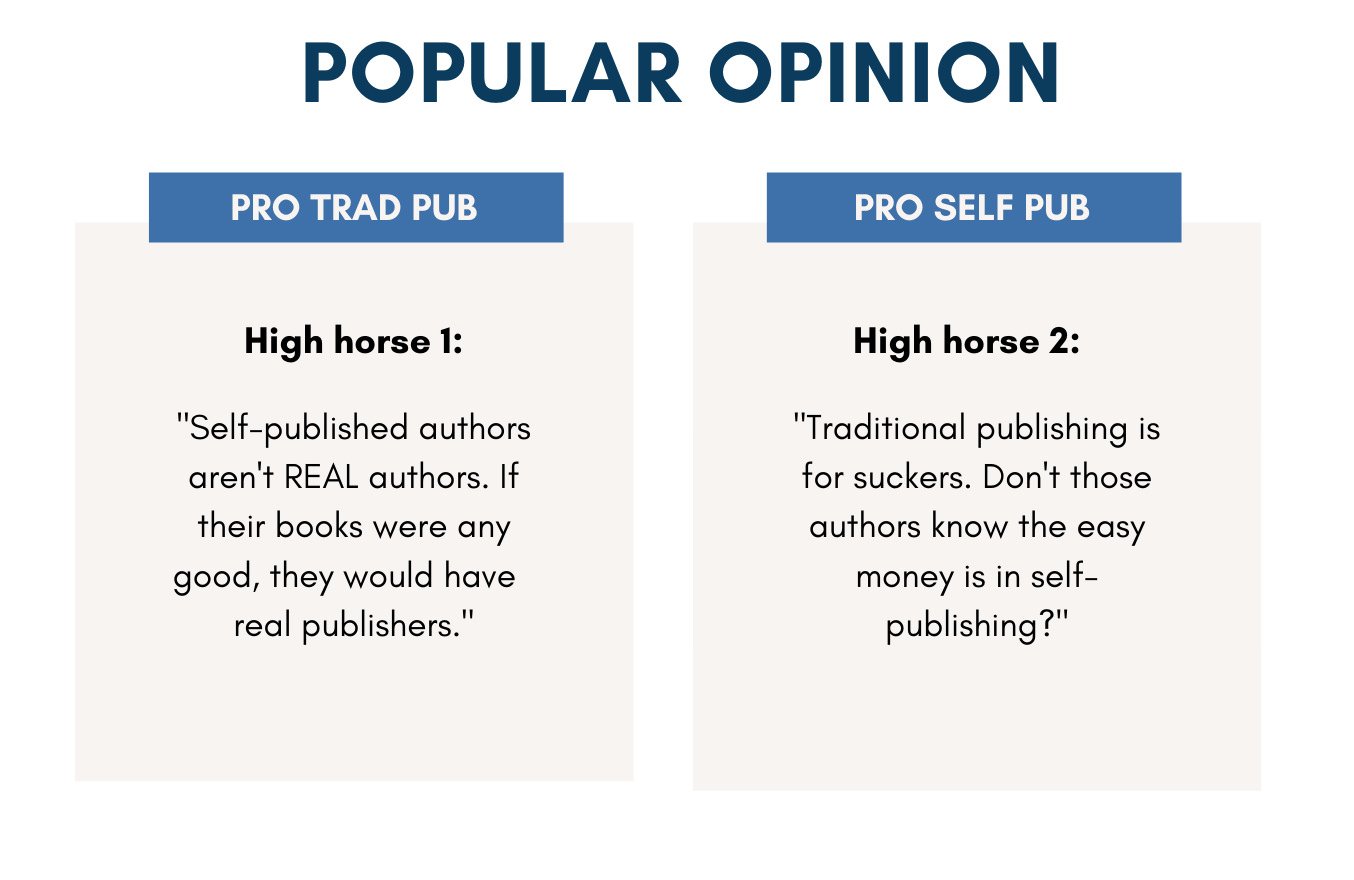Should You Self-Publish Your Book? 2 Strong Opinions
Deciding whether or not to self-publish is one of the most difficult and significant decisions an author will make.
Most people I know have a strong opinion one way or another.
I have two strong opinions.
1. I think self publishing is of tremendous value to readers, writers, and the publishing field.
2. Way too many writers self publish for the wrong reasons.
For context, I’ve traditionally published myself, and I’ve helped my clients publish traditionally with big New York houses, with small niche and literary presses, and also successfully self-publish. Two of my self-pubbing clients have even earned prestigious IPPYs, or Independent Publisher Book Awards. I think both ways of publishing have value, and the choice is very personal.
Before I get further into my own opinions, I also want to recommend my post Self Publishing Vs Traditional Publishing: A Thorough Side-By-Side Analysis, so you can look at the pros, cons, and all the numbers to form your own opinion, which matters more than mine!
Here’s what I love about self publishing:
It allows writers to find readers, and that’s the point, right? Before the internet and e-readers, the barriers standing between writers and their readers were preposterously high.
No other art faced this kind of obstruction. Bands didn’t need record deals to play at bars or clubs. Artists sold their work everywhere from craft fairs to coffee shops to street corners.
Keeping 99% of all writers from sharing their work is just unnatural. It’s like saying, forget pickup games, you can only play basketball if you make it to the NBA.
That doesn’t mean that self-publishing is the same as traditional publishing.
If you’re looking for prestige, which I’ll admit is not always the smartest thing to chase, traditional publishing is the only way to go.
And if you want total control over the publishing process, self-pub is the only option.
I was recently talking with a successful writer friend and mentioned that I might consider self-subbing my novel overseas since I still had the international rights, so why not?
“Don’t self-publish,” he said definitely. “You’re a real writer.” Then he changed the subject. Enough said.
I don’t agree with that view, and I’ve seen that in some cases self-publishing can offer more money and a larger readership. But like it or not, that prejudice is still something you’ll have to contend with. In some genres, especially how-to books, that prejudice is all but gone. In others, like literary fiction, it’s deeply entrenched.
If you’re an entrepreneur, thought leader, or expert writing nonfiction, traditionally publishing will position you at a much more elite level, and yet, even if you got a literary agent and book deal yesterday, you’re looking at 18-months or more before the book would be out. If you self-published you could start using your book to land speaking gigs, publicity, and clients immediately.
But no matter what genre you’re writing in, if you want to see your books in bookstores, 99.9999999% of the time, you’ll need to be traditionally published. (If you’re worried you’re limited to the Big 5 New York publishers, grab my Epic Guide to Publishers and Literary Agencies to see how many options you really have.)
On the other side of the spectrum, while I was recently in Hong Kong working on a story, I met an ex-pat American who is doing so well with her self-published YA fantasy series that she quit her day job and lives off her books. In Hong Kong. The world’s most expensive housing market. It doesn’t get much more real than that.
For now, here are my thoughts on making the decision.
The Right Reasons to Self-Publish:
You have a big budget and enjoy (and are good at) being an entrepreneur.
To succeed at self-publishing, you will need to spend as much time and money producing, marketing, and managing your book/business as you spend writing. If that appeals to you and you have the skills and resources to follow through, read on. For you, this may be a more successful and more lucrative path than going with a big NY publisher.
You want total control.
Control over content: One of the biggest values a traditional publisher brings to the table is a professional editor. A good editor will help take your book to a much higher level without ever losing site of your vision. Sometimes, though, they can push for changes you’d rather not make. Self publish and you can write it your way, accepting all glory or criticism yourself.
Control over marketing: Most likely, the big publishers bring more money and connections to the table than you. On the other hand, you will have no input on their tactics. You will not be able to measure the outcomes of campaigns or change them when they’re not working. No trial and error, no do-overs, no tweaking of ads or media buys or distribution channels. You get what you get and cannot react to market demands.
Control over cost: With a traditional publisher, you can’t adjust pricing, ever. No free books to generate initial interest, no sales, no buy one get one, nothing. Their price is the price.
Control over design: I ended up loving my book’s cover and never could have produced something that good on my own. But I had to fight to get there. The first mockups were so horrendous (think airplanes poorly photoshopped to be pink) that I considered taking my name off the book. I’m not kidding.
You're writing nonfiction and are an entrepreneur or expert.
As I mentioned, you’ll get more status from a traditional book deal, but if you have or can build a strong platform and brand, DIY might be your most lucrative option, especially if you can offer your readers a guide to something tangible (bonus points if they will make more money by reading it).
If you already have a huge audience to sell to, you definitely don’t need a publisher to reach readers. That said, it’s worth at least talking with an agent because a big enough platform could get you an equally big advance and level of marketing support. Plus, they might introduce you to a broader audience.
You're writing non-fiction for a niche topic and are plugged into the audience.
Traditional publishers are skilled at bringing your book to the mass market, but when it comes to a narrow niche, they probably can’t reach readers as well as you can. Working directly with your audience will allow you to tweak the content and the marketing based on their responses.
If your niche is small and specific, you probably won’t even need a massive platform. Your guerrilla marketing techniques can most likely out-maneuver a big, slow, not-innovative publishing company.
You're writing fiction and your head and heart are in the right place.
Maybe you think being in control of the publishing process sounds like a fun experiment. Maybe you’ve tried the traditional publishing route, gotten some traction, but ultimately didn’t get a deal. You still believe in your book, and readers like it too. These days, self-publishing probably won’t hurt your chances with a publisher in the future, so the only real downside is the cost of time and money. However, if you’re still bitter and angry about rejection, STOP! Take some time off to get your mojo back. You’ll produce a better book and sell more copies when you’re feeling confident and having fun. (More on this under the wrong reasons to self-publish.)
You're writing romance.
Romance imprints typically offer lower advances than other publishers, and at the same time, romance readers buy an incredible number of e-books, are on the lookout for new authors, and frequently recommend and review books they like. Combine those factors and you’ve got a good case for self-publishing. I’m not saying I wouldn’t take a romance book to a traditional publisher, but I’d think very carefully before doing so.
The WRONG Reasons to Self-Publish:
You’re in a hurry.
Writing and publishing a book well takes time. If you can’t wait for agents or editors to get back to you, you’re not committed to writing a good book. I promise I know how agonizing the wait can be. (Learn my strategy to improve your odds here.) Speed might be an argument for certain time-sensitive, news-related non-fiction, but not fiction, most memoir, or even how-to that isn’t tied to a flash-in-the-pan trend.
Have you ever noticed that after an author has a runaway best seller, their next book stinks? Everyone’s making so much money they push the writer into rushing the next book, which inevitably lands in bookstores half baked. Even with a support team and a lot of experience, it’s near impossible to pull off a rushed book. If you do it yourself in a mad dash, you don’t stand a chance. No matter how you publish, take the time to do it well.
You think it's a shortcut to a traditional book deal.
I’m thrilled when I meet a happy self-pubbed author who had solid reasons for going DIY! But I feel like crying every time I hear a writer say they shelled out a ton of money to publish their book hoping it was the route to a traditional book deal. It happens, but it’s excruciatingly rare. Sure you can try to go over the fence, around the back, up to the roof, and down the chimney, but it’s easier to try the front door. Check out the number of books by first time authors listed on Publisher’s Marketplace every single day. Then consider the handful of self-published books that have ever gone on to get book deals. The odds aren’t good.
In other words, self-publish because you want to, but never because you think it’s a path to a traditional book deal.
You’re afraid of rejection.
I've got news for you, McFly. You can’t protect yourself by avoiding publishers. Assuming your book is going to be read, you will be rejected by a healthy portion of readers. Take a look at Goodreads sometime. Even your favorite books, even Pulitzer Prize winning books disappoint a lot of people. You will get bad reviews. One of my reviewers said my book was so depressing it made her want to kill herself. Another said it was light chick lit. You cannot, will not, no way, no how, please everyone.
You think you know better than your critics.
If critique partners, instructors, readers, agents, and whoever else are telling you the book needs work, it needs work. Don’t tell yourself they wouldn’t know a good book if it hit them in the face. Readers will be much more judgmental, especially on the internet. Instead, go write a good book. Then decide how best to publish it.
You don’t think you’re famous enough to traditionally publish.
I agree that it’s annoying when a huge celebrity spends three hours writing a book and gets it published. The good news is that the money they will bring in by their fame helps publishers spend money on riskier propositions like no-name authors with good, quieter books. If you don’t think new writers with no connections get book deals, I once again recommend you start reading Publisher’s Marketplace. It happens all the time.
You don’t want to share your earnings with an agent.
That’s just silly. Writing a book is an art, but publishing a book is like a business, and businesses need support, which necessitates expenses. With a savvy professional behind you, you’ll make more than enough extra dough to cover their cut. Think real estate. You could go For Sale by Owner, but a good realtor will sell your home more quickly and for more money. Not to mention the time and stress you’ll save, especially if something goes wrong in the middle of the deal.
A good literary agent is going to work his or her ass off for you, hold you up when you’re losing faith, fight your battles while you stay out of the fray, and flat out make you a better writer. I don’t know exactly how much my agent has made from my work, but I guarantee it’s not enough.
You’re afraid of rejection
You don’t want to share your profits with a publisher.
I almost didn’t include this one because there is some validity to the argument that royalties, especially on e-books, are too low with a traditional publisher. (And if you're writing romance, this may be an excellent reason to self-publish.) However, do not forget how much money they’re fronting you. If you self-publish properly, you will be spending money on editing, proofreading, cover design, production, publicity, marketing, distribution, and printing, all of which will absolutely run into the thousands of dollars and can easily reach $20,000. I’ve heard of people spending much, much more. A traditional publisher will pay for all of that and give you an advance. If you don’t plan on printing paper books, know that e-books only account for about 12% to 30% of sales, depending on genre, and less than 8% of revenue.
In my case, about 75% of sales were hardcover.
You hate everything about New York publishing.
When you’re not getting where you want to as an author, it’s easier to say you don’t care, that publishers are idiots who publish crappy books (because you read one bad book), that paper books are dead, and so on and so forth. I’ll admit that the publishing environment is especially challenging right now, but basing your decisions on negative emotion is dangerous. Bitterness won’t help you sell books, and it sure as hell won’t help you write good books. That takes passion and vulnerability. More importantly, life sucks when you feel that way.
I encourage not to publish one way or another until your emotions are in check. Self-publish because you’ve written the best book you can and you’re excited to share it with the world.
You think you’ll get rich quick.
This is the worst reason to write a book, let alone publish it. No matter how you publish, that’s not likely. If quick money is what you honestly want, be realistic and go into the cocaine business. Seriously though, you might want to explore careers in internet marketing or investment banking or something in Silicon Valley. When it comes to art (and most things in life), endeavors undertaken for money almost never have the heart it takes to succeed. Focus on writing the best book you can. Then make it better. That’s your only hope.
There are people out there on the internet who will tell you it’s so easy to make money at this. Just throw a book together in a few weeks and make a ton of money. But what are they selling you? The odds of getting rich from a really good book are very low, and very arbitrary, and the odds of getting rich from a weak, slapdash book are almost nil. You can cross your fingers and hope to win the lottery, but if that’s your plan, why not save yourself time and money and just buy a lottery ticket?
So what do I really think you should do?
Write a killer book, edit the heck out of it, get professional input (editor, coach, agent etc.), then make the decision carefully. Don’t make the kneejerk decision to publish traditionally just for prestige, and don’t self pub because you’re afraid you won’t get a book deal.
Your book is important, so treat it that way!













